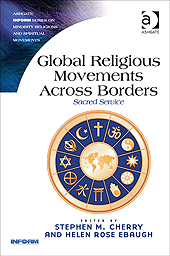Global Religious Movements Across Borders: Sacred Service

Global Religious Movements Across Borders: Sacred Service
Stephen M. Cherry and Helen Rose Ebaugh, eds.
Ashgate Inform Series on Minority Religions and Spiritual Movements 2014
From global missionizing among proselytic faiths to mass migration through religious diasporas, religion has traveled from one side of the world and back again. It continues to play a prominent role in shaping world politics and has been a vital force in the continued emergence, spread, and creation of a transnational civil society.
Exploring how religious roots are shaping organizations that seek to aid people across political and geographic boundaries – ‘service movements’ – this book focuses on how religious movements establish structures to assist people with basic human needs such as food, clothing, shelter, education, and health. Examining a multitude of faith traditions with origins in different parts of the world, seven contributing chapters, with an introduction and conclusions by the senior author, offer a unique discussion of the intersections between religious transnationalism and social movements.
Contents: Preface, Helen Rose Ebaugh; Introduction to religious and global transnational service movements, Stephen M. Cherry; The Redeemed Christian Church of God: African Pentecostalism, Afe Adogame; The Gulen Movement: Sunni Islam, Helen Rose Ebaugh; Soka Gakkai International: Nichiren Japanese Buddhism, Daniel A. Métraux; BAPS Swaminarayan Community: Hinduism, Arun Brahmbhatt; The Gawad Kalinga Movement: charismatic Catholicism, Stephen M. Cherry; Aga Khan development network: Shia Ismaili Islam, Karim H. Karim; Bahá’í international community: Bahá’í faith, Mike McMullen; Studying global transnational religious service movements, Stephen M. Cherry; Index.
About the Editors:
Stephen M. Cherry, Ph.D is an Assistant Professor of Sociology at the University of Houston Clear Lake. His research interests include immigration, religion, Asian Americans, and civic life with a particular focus on Filipino-American Catholics post 1965. Stephen has published articles in various general sociology and sociology of religion journals including his most recent works in the special issue of Sociological Spectrum (2009) and the special issue of Journal of Criminological Studies (2012). In 2006 he received the Society for the Scientific Study of Religion Distinguished Article Award.
Helen Rose Ebaugh, professor, University of Houston, received her Ph.D. in Sociology from Columbia University in 1975 with specialties in organizational Sociology and the Sociology of Religion. In addition to five books, she has published numerous articles in scholarly journals, including American Sociological Review, Social Forces, the Journal of Non-Profit and Voluntary Sector Quarterly, Sociological Analysis and the Journal for the Scientific Study of Religion. She served as president of the national Association for the Sociology of Religion, helped organize and served as the first chair of the American Sociological Association’s Section on the Sociology of Religion and is past president of the Society for the Scientific Study of Religion. Ebaugh received two consecutive research grants from the Pew Charitable Trusts to study religion and the new immigrants in the United States. The results from the first grant that focused on the role of religious congregations in the incorporation of new immigrants is described in Religion and the New Immigrants: Adaptations and Continuities in New Immigrant Congregations (AltaMira Press, 2000). The second book from the project, Religion Across Borders: Transnational Religious Networks (AltaMira Press,s 2002) is an analysis of the impact of religious ties among immigrants in the United States and family/friends in their home countries. With a major grant from the Lilly Endowment, Ebaugh studied inter-faith coalitions and their provision of social services. She routinely teaches graduate and undergraduate courses in the Sociology of Religion and the study of World Religions.